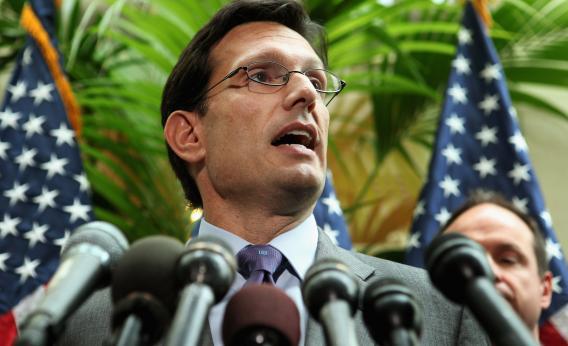Last week, Eric Cantor told conservatives at the Values Voter Summit that he was “increasingly concerned” with the Occupy movement’s protests, and the endorsements that this “mob” was getting in Washington. “Some in this town,” he said, “have actually condoned the pitting of Americans against Americans.”
In his weekly briefing with reporters today, Cantor sounded a different note: He understood the economic angst out there. But he was disappointed that some Democrats had endorsed a movement that pitting some Americans against other Americans, over the issue of wealth.
I mentioned that Steny Hoyer, the Democrats’ whip, had just compared the Tea Party’s 2009 protests at congressional town halls to the Occupy protests – the Occupy protests, he said, may actually be more sober. What did Cantor see as the difference between Republicans endorsing the Tea Party’s protests in 2009 and 2010 (I was thinking of moments like the March 2010 health care vote, when Michele Bachmann and others walked outside the Capitol to cheer on protests) and the Democrats’ statements now?
“The Tea Party is very different,” said Cantor. “The Tea Party were individuals that were attempting to address their grievances, seeking redress of their grievances, from the government they elected. It’s different, from what I see, of the protesters on Wall Street and elsewhere, that are pitting themselves against others outside of government in America. That’s the difference. As far as what Steny said… all I can tell you is, folks who were involved and continued, and continue to be so, in the Tea Party, are worried about government and its policies. It’s not pitting one part of our country against another. And you didn’t hear most of [Republicans] us encouraging any type of violent behavior, or whatever, when that was occuring. Everyone in this country has the right to speak out. That’s the beauty of our system. But when elected leaders come in, and condone attacks on others in our country, that’s not how it was [with us], it’s not leadership.”
A short while later, Politico’s David Rogers pressed on part of the answer.
“Do you not see the government as part of the people?” asked Rogers. “You said before, the Tea Party was asking for redress against the government. Do you regret using the word mob? I mean, You say these people are divisive against other Americans.”
“I did not say that,” said Cantor.
“You said they were pitting themselves against other Americans,” said Rogers.
“I said they are aiming their ire at others in our society,” said Cantor.
“You made a distinction between that and aiming their ire against the government,” said Rogers.
“Right,” said Cantor. “The ire, from the Tea Party standpoint, is at Washington. It’s at the government and its policies.”
“And do you not see the government as representing the people?” asked Rogers.
“Sure,” said Cantor, “it’s of the people. But we’re in elected positions and trying to solve problems. I don’t believe that our role is to inflame a division between different parts and sectors of…”
Rogers cut him off. “I’m not asking about that,” he said. But the pen-and-pad session was over.
